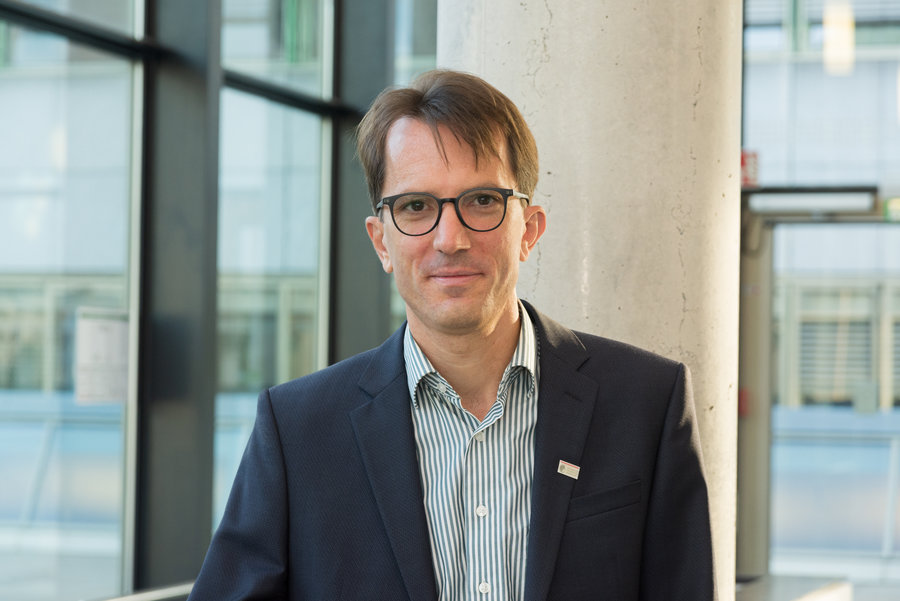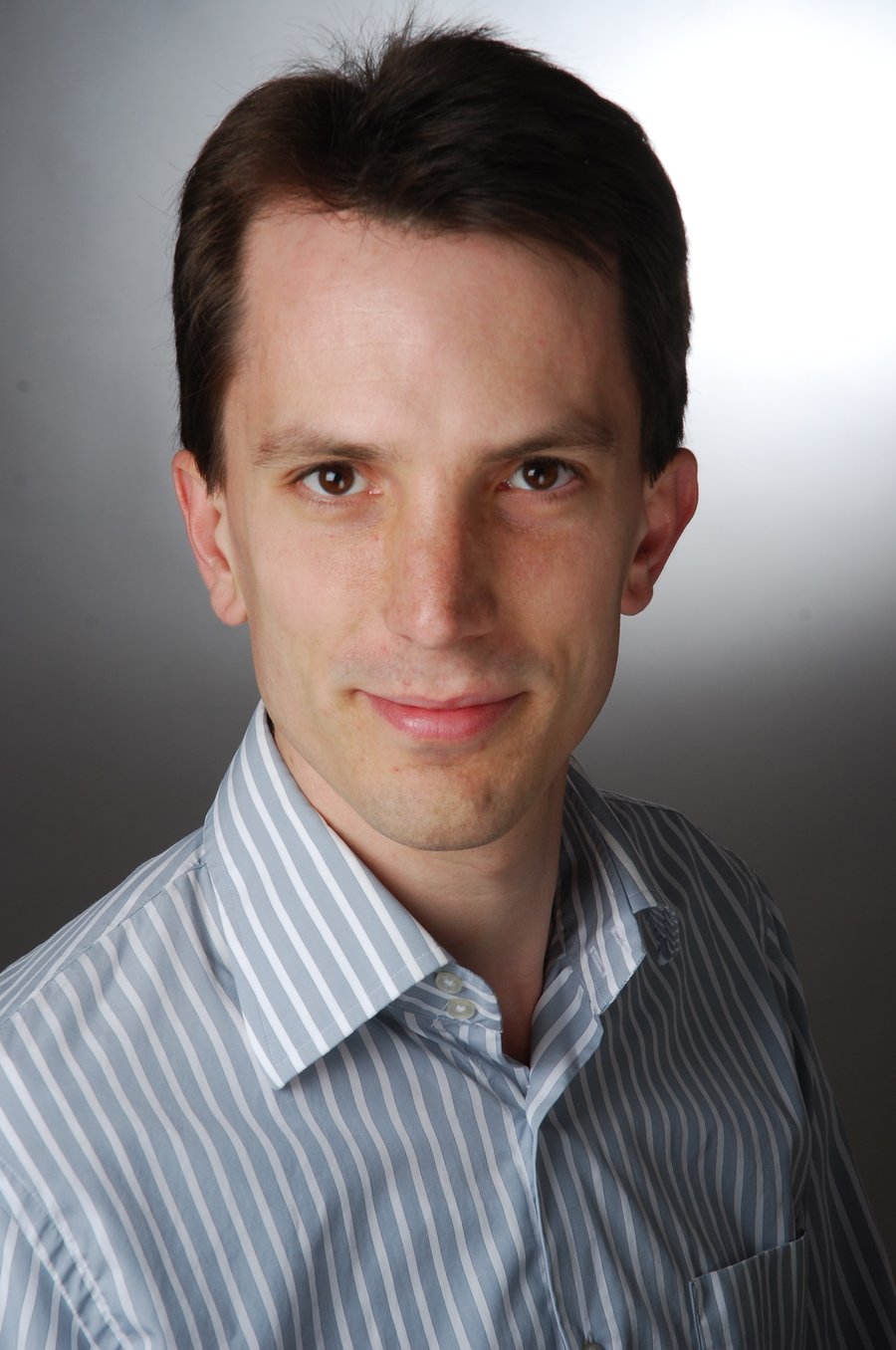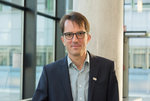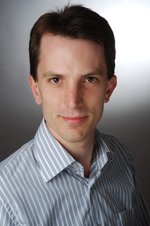European Union grants millions to GSI research project on tumor therapy: Prestigious ERC award for Professor Christian Graeff from Biophysics
23.11.2023 |
Professor Christian Graeff from GSI’s Biophysics Department has been awarded the highly sought-after Consolidator Grant from the European Research Council (ERC). The prestigious research funding award supports a project to improve tumor therapy with a funding sum in the millions. Christian Graeff will lead this research project as principal investigator and conduct it with a corresponding team. The renowned prize also underlines the outstanding quality of scientific research at GSI Helmholtzzentrum für Schwerionenforschung and the future accelerator center FAIR.
The ERC grants are funding and acknowledgement in equal measure: They will support outstanding scientists and scholars at the career stage where they may still be consolidating their own independent research teams to pursue their most promising scientific ideas. They each provide a maximum of two million euros in funding over a period of five years.
Professor Christian Graeff is deputy head of the Biophysics Department, head of the Medical Physics group at GSI Biophysics and professor at the Department of Electrical Engineering and Information Technology (ETIT) at TU Darmstadt. His teaching is within the framework of the Master's program in Medical Technology, which provides knowledge and skills in engineering and human medicine. His research has focused on innovative applications of ion beams (for example, research on the treatment of cardiac arrhythmias with the use of carbon ions) and the development of methods for irradiating moving targets with scanned ion beams. He also made important scientific progress in the field of developing new therapy control systems for raster scanning.
In his new project entitled “Portal Range Monitoring in Mixed Ion Beam Surgery” (PROMISE), Christian Graeff aims to further develop the process of tumor therapy with charged particles. “Half of the approximately four million annual cancer cases in Europe receive radiotherapy. While many cancer patients have benefitted from technical improvements in recent years, widespread diseases, such as pancreatic and lung cancer, still have dismally low cure rates. Carbon ion radiotherapy (CIRT) offers unprecedented precision in delivering tumor dose, and can be the much needed game changer for these patients. However, CIRT is still vulnerable to uncertainties in patient positioning, anatomy changes and organ motion,” explained Christian Graeff. Novel strategies for image guidance and beam range assessment are crucial to unlock the full potential of CIRT for the best possible patient care.
This is where the new ERC funded project comes in. The idea is to employ a combined beam for both medical treatment and imaging purposes during treatment. PROMISE, for the first time, will produce mixed ion beams that enable concurrent treatment and image guidance. Carbon ions deliver the dose to the target while Helium ions, simultaneously accelerated to the same velocity, traverse the patient and monitor tumour location and beam range. PROMISE could realize an imaging, that provides real-time information on the target anatomy as seen by the treatment beam. Coupled with innovative detectors, AI-based image recognition, and online dose reconstruction, this technique could enable to drastically reduce safety margins, and achieve the full potential of CIRT.
The GSI accelerators are uniquely suited to develop the first mixed beam of Carbon and Helium, along with strategies for their cost-effective translation to existing and future clinical CIRT centers. The method will be validated experimentally on the GSI campus. “The mixed beam image guidance of PROMISE can lead to a paradigm shift in Carbon ion radiotherapy and could therefore also enable better treatment,” summarized Christian Graeff.
After studying medical engineering at the Hamburg University of Technology, Christian Graeff received his doctorate with a study on computed tomography-assisted diagnostics of osteoporosis. He worked as postdoc in the Medical Physics group of the Biophysics Department at GSI, before taking over as head of this group in 2012. For his scientific achievements, Christian Graeff was awarded the Günther von Pannewitz Prize of the German Society of Radiation Oncology (DEGRO) and the Behnken-Berger Prize for young scientists.
Professor Christian Graeff said: “I would like to thank the European Research Council for giving me this great opportunity through the ERC Consolidator Grant. I am looking forward to fulfilling PROMISE together with my team and the renowned experts of the GSI accelerator department“. The head of GSI’s Biophysics, Professor Marco Durante, said: „I am delighted that Christian Graeff has been honored and funded for his fantastic idea. This is the second ERC in a few years to the Biophysics Department, a clear sign that our research activity is cutting edge and successful. Both ERC grants are introducing revolutionary concepts in particle therapy, and both exploits the unique opportunities provided by the GSI/FAIR accelerator facility. Once again, we show how our success in biomedical research is possible thanks to the extraordinary infrastructures of the GSI/FAIR facility”. Professor Paolo Giubellino, Scientific Managing Director of GSI and FAIR, said: “I am extremely pleased for Professor Graeff, who is tackling important challenges in medical physics with this innovative project and his commitment. The grant also underlines the outstanding research perspectives at the GSI Helmholtzzentrum and the international accelerator center FAIR. This is due to the uniqueness of our facilities but even more to the exceptional quality of our human capital in experiments and accelerators. In the future, we will be able to further expand the prospects of such groundbreaking research and enable pioneering achievements”. Professor Maria Leptin, President of the European Research Council, said: „The new Consolidator Grant winners represent some of the best of European research. It is disappointing that we cannot support every deserving project simply due to budget constraints“. (BP)
More information
Press release of the European Research Council
















